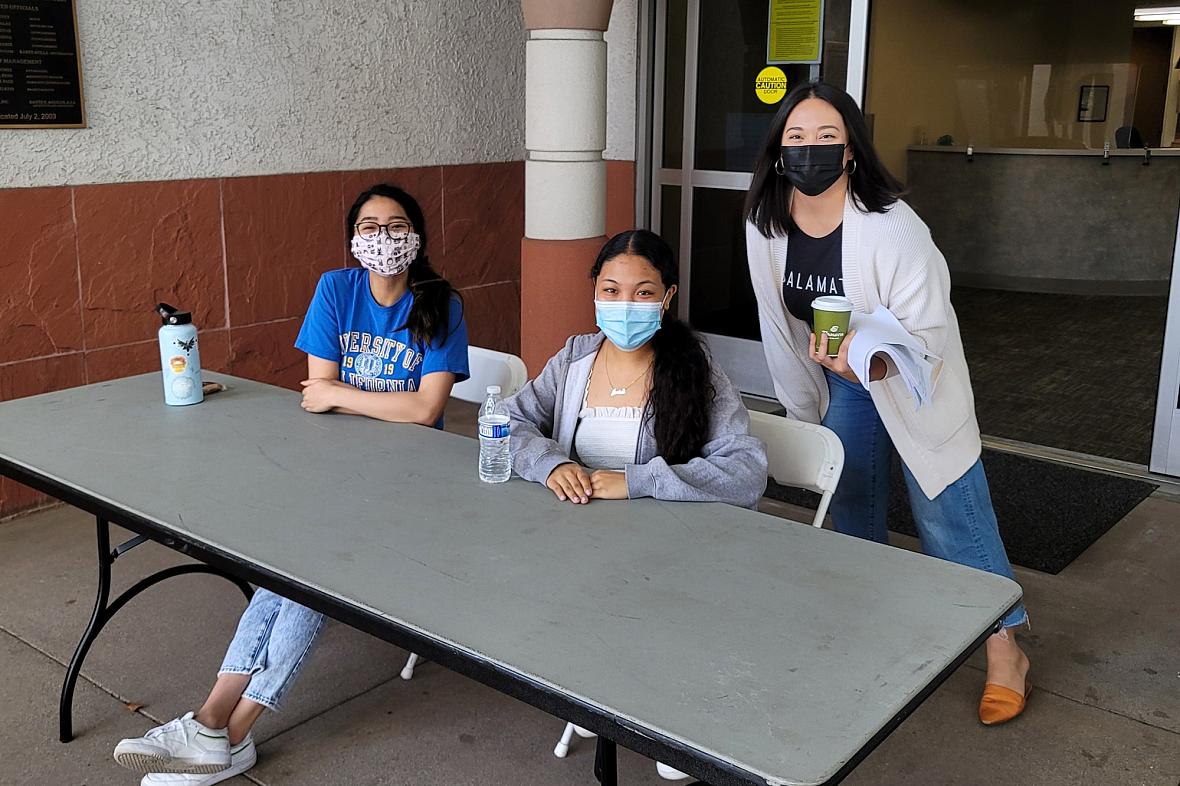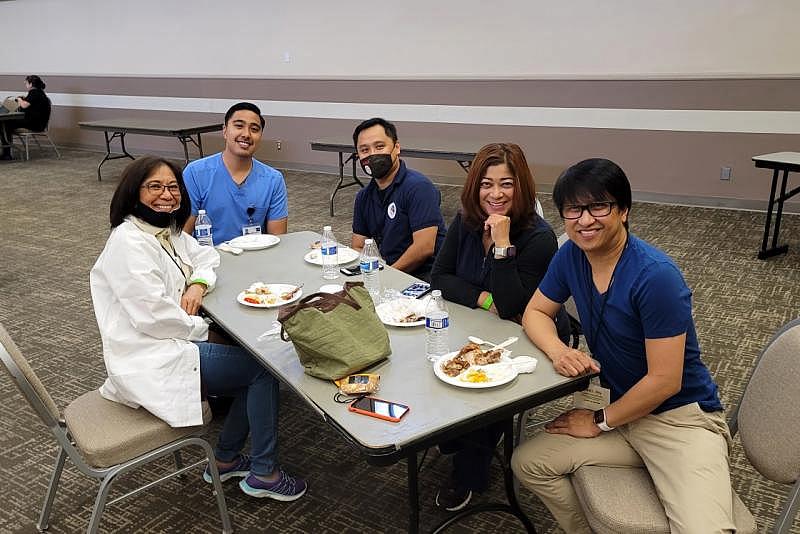Part 3: To address Filipino American health disparities in future, experts look to past inequality
This is the third and final story in a three-part NBC Asian America series, “The impact of COVID-19 on Filipino Americans,” by Agnes Constante, supported by the USC Annenberg Center for Health Journalism 2020 Data Fellowship.
Her other stories include:
Part 1: Filipino American nurses, reflecting on disproportionate Covid toll, look ahead
Part 2: 85% of Filipino Americans reported Covid mental health issues, more than any Asian group

On June 5, community leaders helped with a pop up vaccination clinic in Carson, Calif.
Fred Docdocil
Throughout the pandemic, Roy "RJ" Taggueg saw how much care and effort Filipino American nurses poured into their jobs.
"You can tell just the ways in which they talk about their work -- they love their work, they love their patients, they love that the work that they're doing saves lives," said Taggueg, director of research at the UC Davis Bulosan Center for Filipino Studies.
He saw them do their jobs with a work ethic Filipinos are often commended for -- for being masipag, or hardworking, he said.
Traits like that — along with the ability to easily assimilate — receive praise and are often a source of pride for Filipino, Taggueg said. Yet they’re ones that can make them exploitable in work environments and ones that can be traced back to the Philippines' colonial past. It’s a history Taggueg credits a contributor to the disparities that raised the risk of Covid-19's impact on Filipino Americans. Other community leaders and advocates say structural factors, particularly the lack of disaggregated data, are another culprit.
The exact Covid impact on the community is unknown because death data on Asian American subgroups is lumped into a single category. But they were likely at greater risk of getting sick, being hospitalized or even dying from Covid-19 due to a number of factors, including their high representation among health care workers, higher rates of underlying health conditions and a high share living in multigenerational households.
EJ Ramos David, a professor at the University of Alaska, Anchorage, whose research focuses on the impact of colonial mentality on Filipino Americans, noted that one aspect of that mentality is colonial debt -- a tendency to tolerate, accept or minimize experiences of injustice.
“It can come out as, ‘I might be putting myself at risk right now because my boss is forcing me to work in these conditions. But at least I'm here in America,’” he said.
A lack of data as 'a form of structural inequality' and how to solve it
Taggueg said Covid-19 exacerbated existing problems among Filipino Americans that were overlooked. Among those include the risk nurses face on the job and the mental health impact of household dynamics on college students.
He incorporated Covid-19-related questions into a nationwide survey — one of the first on Filipino Americans that has been conducted since the Filipino American Community Epidemiological Study in the 1990s. He said the Filipinx Count Survey, which is slated for publication in July, was originally carried out so that there would be a database about and for Filipino Americans by the community.
“Because of the fact that we weren't being covered by researchers — at least quantitative ones very specifically — for a database, we needed to create that,” Taggueg said.
Survey findings included that the vast majority of respondents who reported mental health symptoms attributed them to Covid-19, approximately one-third were essential workers, and students faced unique challenges of adjusting to remote learning when they had to move back home and were removed from their social support systems.
Collecting disaggregated data to fill in missing gaps on Filipino American data is one area that advocates like Taggueg have invested efforts into.
“And then how do we further develop that argument that refusal of data collection systems to report disaggregated data is, in fact, a form of violence or a form of structural inequality that allows disparities to persist?” said Carlos Oronce, president-elect of the Filipinx Community Health Association. “It shouldn't be thought of as more of a passive thing and more of an action that systems do to prevent the addressing of disparities.”
Available data from the 2017-18 California Health Interview Survey, an annual self-reported survey that offers insight into the health and healthcare needs of Californians, shows the group fares favorably in other socioeconomic indicators. The majority have health insurance, had a preventive care visit in the past year, live above the poverty line, and are proficient in English.
Yet the survey also reveals health disparities in Filipino Americans that are hidden when Asian Americans are examined collectively. Asian Americans as a whole appear healthier than the general U.S. population. But when data is disaggregated, Filipino Americans had higher rates of asthma, diabetes, hypertension and being overweight compared to Asians overall. They also had higher levels of the first three health conditions compared to non-Hispanic whites.
Taggueg said that when it comes to closing the gap on disparities that exist despite favorable socioeconomic indicators, it’s crucial to consider the role of deeply rooted factors like capitalism and the Philippines’ history with colonialism.
“We learn these very specific mindsets regarding things like work, like productivity, like having to be adaptable — they're all under this context of these westernized colonial mindsets,” he said. “We are taught to go to the U.S. because that's where you can really exercise your opportunity to climb over the world. But the reality is, the barriers for that are still very much keeping people down.”
Taggueg and researchers who authored an article in the journal "Gender, Work & Organization" say they saw the impact of colonial mentality on Filipino American nurses, who cited burnout as a reason they considered leaving their job. Yet they were less likely to do so, partly because of “factors influenced by a colonial past that have entrapped them into staying,” researchers wrote. They also account for about 25 percent of registered nurse deaths, while representing 4 percent of registered nurses across the country, according to the union National Nurses United.
While conversations about the role of capitalism and colonialism remain sparse, individuals focused on research say the data they collect will reveal areas of need in the community that can be used to make a case for resources.
Melanie Sabado-Liwag, a professor of public health at California State University, Los Angeles is collecting responses for a survey about Filipino experiences during the pandemic that includes questions on mental health, health behaviors, attitudes toward vaccination and experiences with discrimination.
She said she then plans to hold focus groups to contextualize the data, and hopes the findings can be used to help the community post-pandemic to apply for grants, create interventions and health campaigns, and build on existing policy.
“This is a jumping off point for whatever needs to happen post pandemic,” she said.
Last year, the Filipino Young Leaders Program launched Tayo Help, a virtual help desk that provides culturally tailored, multilingual information to the Filipino American community in Los Angeles. Visitors to the site can submit questions anonymously, through which the group has been able to gather qualitative data on what information users lack.
“When you think about the cultural barriers that often are found in our community, things like hiya — you know, shame — oftentimes we're trying to amplify these questions we know people are either too embarrassed to ask or they're too afraid to ask,” Leezel Tanglao, chair of the group’s Covid-19 Task Force, told NBC Asian America in November. She noted that a common topic the help desk received questions about was vaccines.
On June 5, community leaders helped with a pop up vaccination clinic in Carson, California.Fred Docdocil
Another response effort came several months after the pandemic hit when a group of Filipino Americans established the Filipinx/a/o Covid-19 Resource and Response Team, which has since been renamed to the Filipinx Community Health Association.
“We realized there weren't any national dialogues or discussion venues of people in public health who thought about Filipino Americans,” Oronce said. The group is dedicated to ensuring visibility, accurate data and the allocation of resources for the Filipino community.
Its first major effort was sending a letter to the Biden-Harris Administration’s COVID-19 Health Equity Task Force about the disparities in Covid-19 cases and deaths among Filipino Americans. It didn’t receive a response, but members of the group — including Palma, Taggueg, Sabado-Liwag and Tanglao — have forged ahead with individual data collection efforts. The group also created a podcast about Covid-19 issues and is working on an upcoming mental health webinar series, Oronce said. And on June 5, community leaders helped with a pop up vaccination clinic in Carson, California, where a dozen individuals were vaccinated, he added.
Surveying cultural barriers and sentiment on vaccines
Throughout the summer, Dr. Melissa Palma hopes to collect 500 responses to a survey she’s designing on vaccine attitudes.
It’s research that Palma, a preventive medicine, public health and family medicine resident at Cook County Health in Chicago, is spearheading as part of the non-profit Filipino Young Leaders Program’s Covid-19 Task Force initiatives. Researchers aim to show through the survey how vaccinations have rolled out in the Filipino American community, what proportion of the community has received the vaccine, if the elderly were able to receive it as soon as it was available to them, and what barriers may have caused delays.
She added that they’re also looking to uncover aspects of Filipino culture that might make people less likely to seek out care, and explore a potential link to vaccination attitudes in the Philippines. She noted that dropping immunization rates in the Philippines led to one of the biggest measles outbreaks there in 2019.
“Filipino Americans don't just exist in the United States,” she said. “We exist in community and in relationship with our families from back home.”
Taggueg said all the efforts that have emerged in response to the toll of Covid-19 on Filipino Americans are helpful to problems they face. He also said that the problems are symptoms of larger core issues in which disparities in the community are rooted.
“The fact of the matter is, our current systems are not prepared to have handled the things that we had gone through. Not just as a community, but as a society,” he said.
He believes the next pandemic will likely be just as devastating on communities of color, including Filipino Americans, because society isn’t addressing roots like capitalism and the impact of colonialism.
“We have no reason to expect that it's ever going to be better because we don't have the support that we need,” he said. “We're ignored. We're not even seen as a place to divert resources to.”
“If we don't address those core issues, then those symptoms might go away, but new ones are going to pop up in different ways. And I think Covid shows that,” Taggueg said
This is the third story in a three-part NBC Asian America series, “The impact of COVID-19 on Filipino Americans,” supported by the USC Annenberg Center for Health Journalism 2020 Data Fellowship. Read the first story here and the second story here.
[This story was originally published by NBC News].
Did you like this story? Your support means a lot! Your tax-deductible donation will advance our mission of supporting journalism as a catalyst for change.

